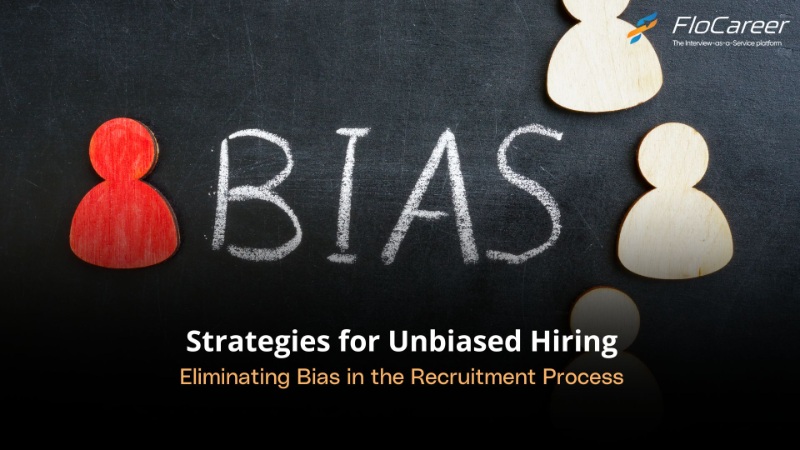Strategies for Unbiased Hiring: Eliminating Bias in the Recruitment Process
When it comes to hiring, unconscious biases can inadvertently influence decisions, potentially leading to suboptimal hires. Both recruiters and applicants need to be aware of these biases to ensure a fair and objective hiring process. In this article, we'll delve into effective strategies to remove unconscious bias from the hiring process, fostering an environment where the best person for the job is selected based on merit.

Ways to Remove Unconscious Bias in Hiring
Language is a powerful influencer, and its impact on job descriptions cannot be overstated. The choice of words can inadvertently perpetuate gender bias. To neutralize gendered wording, it's crucial to consciously opt for terms that are inclusive and unbiased. Replace terms like "manpower" with "human resources" and shift from gender-specific initiatives to more inclusive alternatives. This simple adjustment ensures that all individuals, irrespective of gender, feel welcomed, and encourages a diverse range of candidates to apply, setting the stage for an unbiased hiring process.
Revise Job Descriptions:
Reworking job descriptions involves more than just a cosmetic makeover. It's about focusing on essential qualifications and skills required for the role. By clearly outlining these prerequisites, you establish a transparent criterion for candidate evaluation. Additionally, integrating a section that underscores the company's commitment to diversity sends a powerful message. This not only sets a positive tone for an inclusive hiring process but also discourages any potential biases, fostering an environment where qualifications and skills take precedence over any other factors.
Define and Set Diversity Goals:
The path to diversity begins with a clear definition of what it means for your organization. Engage in open dialogues with your team to foster a shared understanding. Once defined, set achievable diversity goals that align with your organization's values. Whether it's promoting diversity in terms of backgrounds, religions, races, or orientations, clear goals provide a roadmap. Crucially, these goals guide the hiring process, ensuring that decisions are based on merit, qualifications, and skills, promoting a fair and unbiased work environment.
Make Hiring a Collective Effort:
Breaking away from individualized decision-making is pivotal in removing biases. Transform the hiring process into a collective effort where multiple stakeholders contribute to identifying potential candidates. Encourage hiring managers to collaborate, share insights, and collectively assess candidates. This collaborative approach not only leverages diverse perspectives but also ensures that decisions are well-informed and unbiased. Inclusivity becomes ingrained in the decision-making process, contributing to a more equitable workplace.
Cross-Functional Interview Teams:
Assembling a cross-functional interview team is a strategic move to combat biases. By including individuals from various departments who don't regularly collaborate, you introduce diverse perspectives. Delaying feedback until after the hiring decision is a crucial step in minimizing individual biases. This precaution ensures that assessments are based on objective criteria, contributing to fair and unbiased evaluations of candidates.
Structured Interviews:
Structured interviews provide a systematic approach to candidate assessments. Following a predetermined set of questions ensures consistency and objectivity. Structured interviews are designed to evaluate candidates based on their skills and characteristics relevant to the job. By minimizing subjective judgments, this approach fosters fairness throughout the hiring process, focusing on merit and qualifications.
Skills Testing:
Implementing skills tests is a strategic move to objectively assess candidates. These tests delve into candidates' abilities and qualities that are directly relevant to the job. By emphasizing objective measures, skills tests identify the most qualified candidates, regardless of their background. This approach is invaluable for gauging not only technical skills but also work ethic and communication abilities, ensuring a comprehensive evaluation.
Build a Foundation of Trust:
Trust is the bedrock of an unbiased hiring process. Establishing trust begins with open communication and honest assessments. Encourage all stakeholders to share their thoughts openly. Recognizing and rewarding positive behaviors fosters a culture of transparency. This foundation of trust creates an environment where both candidates and decision-makers feel secure, paving the way for fair decision-making and positive candidate experiences.
Utilize Multiple Hiring Channels:
Diversifying hiring channels is more than just a logistical consideration; it's a strategic move to minimize biases. Including various interview formats like email, phone, and on-site interviews broadens the scope of candidate interactions. This approach not only minimizes biases that may arise from face-to-face interactions but also ensures a more extensive candidate pool. By reaching candidates through diverse channels, organizations increase the likelihood of finding the best fit for the role.
Focus on Behavioral Needs:
Shifting the focus to the behavioral requirements of the job emphasizes qualities that are directly related to the role. This strategic move avoids personal preferences that might introduce biases into the decision-making process. Blind interviews, where candidates are unaware of the specific position until after the interview, further contribute to impartial decision-making. By emphasizing behavioral needs, hiring managers can ensure that candidates are evaluated based on qualities that benefit the job, fostering a fair and objective selection process.
In conclusion, fostering an unbiased hiring process requires a multifaceted approach. By implementing these strategies, organizations can mitigate unconscious bias and ensure that hiring decisions are based on merit, skills, and qualifications. Outsourcing interviews with Flocareer can further enhance this process, providing an impartial and comprehensive evaluation of candidates. Embrace these strategies to build a diverse and talented workforce, driving the success of your organization.
Check out our latest blog on cost of bad hire


